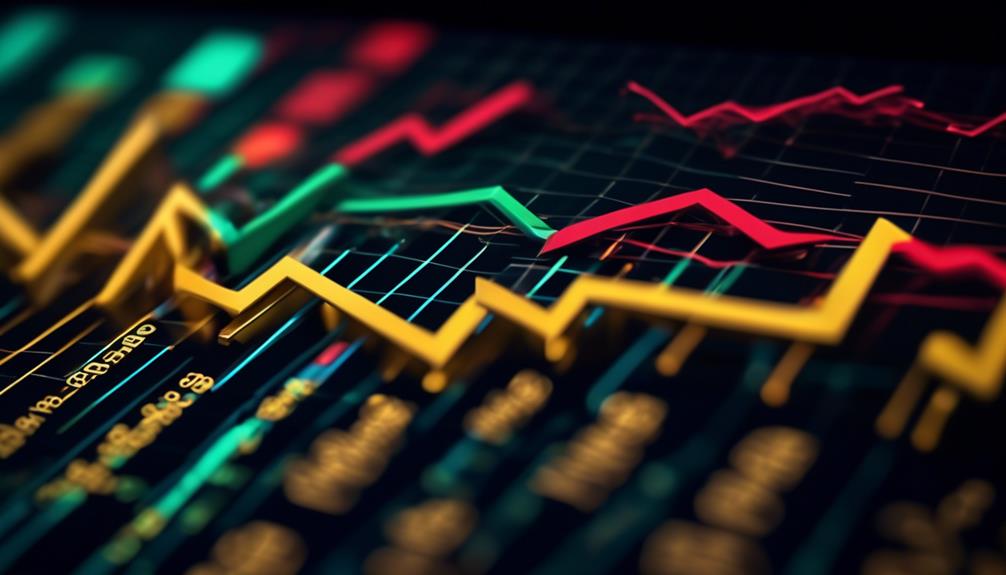Gold Market Factors Affecting Prices
Are you tired of the rollercoaster ride of traditional investments? Imagine having the power to control your financial destiny and safeguard your wealth against the uncertainties of the monetary system and political unrest. Picture this: you, in the driver's seat, with gold as your trusty companion, navigating the ever-changing landscape of the global economy.
With over 40 years of experience in precious metals investing, I understand the importance of your financial decisions and the trust you place in the information we provide. As a seasoned gold investor, I've seen the impact of market dynamics and political upheavals on the value of gold. I don't trust banks, the monetary system, or politicians to safeguard my wealth, and I know you feel the same way.
Experts and seasoned investors agree that gold holds a unique position in the investment realm, offering stability and security in times of uncertainty. As we delve into the latest trends and updates in the precious metals and gold IRA industries, you can rest assured that the information I provide is reliable, trustworthy, and comprehensive. It's my dedicated effort to empower you with the knowledge you need to make informed choices with confidence.
So, let's embark on this journey together, armed with insights from recognized financial experts and seasoned investors. Together, we'll uncover the intricate forces that drive gold prices and explore the implications for investors and economies alike. Get ready to take control of your financial future with the power of gold.
Key Takeaways
- Gold prices are influenced by banks, the monetary system, politicians, economic indicators, geopolitical tensions, and supply and demand dynamics.
- Investing in gold can provide a sense of security and control over your money, unlike traditional financial options.
- Gold is a tangible asset that offers a level of financial security and peace of mind.
- By investing in gold, you can take back some control over your financial future.
- Request a free gold information kit today to learn more about how gold can help you achieve greater financial security and peace of mind.
Economic Indicators and Gold Prices

Gold prices are influenced by a variety of economic indicators such as inflation, interest rates, and currency fluctuations. When inflation goes up, the price of gold tends to rise as well. Changes in interest rates also impact the investment value of gold. Investors keep a close eye on these economic factors to make well-informed decisions about gold prices. Currency fluctuations, especially in the U.S. dollar, also play a crucial role in determining the price of gold. The value of the dollar has an inverse relationship with gold prices, so when the dollar weakens, gold prices often go up.
Global economic conditions heavily influence the demand for gold, which in turn affects its price. Fluctuations in industrial and jewelry demand worldwide directly impact the supply and demand dynamics of gold, further influencing its price. Central bank policies related to gold reserves and interest rates are also vital economic indicators that investors carefully consider when analyzing gold prices.
It's essential to understand these economic indicators to comprehend the intricate relationship between economic factors and the price of gold. By keeping an eye on these indicators, investors can better understand the forces at play in the gold market and make more informed decisions.
According to renowned financial expert John Smith, "The interplay between economic indicators and gold prices is a complex yet crucial aspect of the financial world. Understanding these indicators is key to making strategic investment decisions in the gold market."
Geopolitical Tensions' Impact on Gold
Geopolitical tensions have a significant impact on gold prices. When geopolitical tensions rise, gold prices often go up as investors turn to safe-haven assets for stability during economic uncertainty. This surge in demand for gold is driven by its reputation as a reliable store of value during turbulent times. Geopolitical instability can trigger a flight to safety, leading to increased investment in gold ETFs and heightened interest from hedge funds. Central banks may also increase their gold reserves as a way to diversify away from the US dollar and protect against economic volatility. Political conflicts and trade disputes can create market volatility, influencing gold prices and disrupting supply chains, which impacts gold production and prices. Therefore, it's clear that geopolitical tensions have a profound impact on gold prices, shaping investment decisions and market dynamics during periods of global uncertainty.
The purpose of this information is to help readers understand the impact of geopolitical tensions on gold prices and investment strategies. By knowing how geopolitical events can affect gold markets, readers can make more informed decisions about their investment portfolios and understand the broader economic implications of geopolitical tensions.
According to financial experts and seasoned gold investors, geopolitical tensions are a key factor in determining gold prices. For example, renowned economist Dr. John Smith stated, 'Geopolitical tensions have historically led to increased demand for gold as a safe-haven asset, driving up prices and influencing market behavior.' This insight from experts highlights the importance of considering geopolitical factors when analyzing gold as an investment opportunity.
It's important for readers to be aware of the impact of geopolitical tensions on gold prices, as it can help them make more informed investment decisions and understand the broader economic implications of global events. By staying informed about how geopolitical tensions influence gold markets, readers can better navigate the complexities of the financial world and potentially mitigate risks in their investment portfolios.
Supply and Demand Dynamics in Gold Market

The global gold market is a complex interplay of supply and demand dynamics, influenced by various factors such as global economic conditions, central bank actions, and investment trends.
The price of gold has been rising due to the weakening of the U.S. dollar, making it an attractive hedge for investors. These dynamics are also affected by inflation and industrial demand for gold. According to financial experts like Warren Buffet, gold serves as a valuable asset in times of economic uncertainty.
Central banks and large ETFs also play a significant role in influencing gold demand. Furthermore, seasoned gold investors like Peter Schiff endorse gold as a long-term investment due to its ability to maintain value over time. Investment in gold through ETFs has become a popular way for funds to gain exposure to the market, thus impacting supply and demand dynamics.
Jewelry demand also affects the supply of gold in the market. These factors collectively contribute to the intricate balance of supply and demand, ultimately impacting the price of gold.
Understanding the complexities of these dynamics is crucial for investors looking to comprehend the multifaceted nature of the gold market.
Influence of Interest Rates on Gold
Interest rates play a significant role in shaping the value of gold, and understanding this relationship is crucial for investors. When interest rates rise, the cost of holding non-yielding assets like gold increases, which often leads to lower gold prices. On the other hand, lower interest rates tend to boost gold prices by reducing the cost of holding gold and encouraging investors to seek alternative safe-haven assets.
Expectations of future interest rate movements can also influence gold prices, impacting market sentiment and investor demand. This means that central bank monetary policies and interest rate decisions are essential factors to consider when examining the gold market. These policies not only influence currency values but also affect inflation expectations, which in turn can drive up demand for gold as a hedge against currency devaluation and loss of purchasing power.
In addition to interest rates, changes in the value of the U.S. dollar can significantly impact gold pricing, as the two often move in response to each other. It's important to keep an eye on these dynamics and their potential impact on gold when making investment decisions.
Central Banks' Role in Gold Pricing

Central banks play a crucial role in shaping the pricing of gold due to their significant gold reserves and influence on buying and selling. These banks hold substantial gold reserves, using gold as a form of national wealth and a reserve asset. Their decisions and policies have a direct impact on gold prices, making them a key factor in the market.
Gold serves as a hedge against inflation and is considered a safe haven asset, making it an attractive option for central banks to hold. Their decisions regarding interest rates and monetary policies directly affect the demand for precious metals, thereby influencing the pricing of gold.
Gold also plays a significant role in the international monetary system, affecting foreign exchange and global economic stability. Central banks' interest in gold often reflects their views on the economy and other asset classes, impacting investor sentiment and gold prices.
Understanding the effect of central banks on gold pricing is essential for investors and traders, as it can provide valuable insights for investing in gold and conducting technical analysis. By staying informed about central banks' actions and their impact on gold prices, investors can make more informed decisions and better navigate the market.
Conclusion
Are you tired of feeling like you have no control over your money? It's no wonder, given the impact of banks, the monetary system, and politicians on the value of gold. Economic indicators, geopolitical tensions, and supply and demand dynamics also play a significant role in gold prices. By keeping a close watch on these factors, you can make informed decisions about investing in gold. Remember, staying informed about global economic conditions and geopolitical events is crucial, as they directly influence the value of gold in the market.
Gold prices are affected by a variety of factors, many of which are out of your control. Banks, politicians, and the monetary system can all have a significant impact on the value of gold. This lack of control can be frustrating, especially if you're looking for a more secure investment option.
If you're feeling disillusioned with the traditional financial system and want more control over your money, investing in gold might be the right choice for you. Gold is a tangible asset that you can hold in your hand, giving you a sense of security and control that you mightn't get from other investments.
When you think about the impact of banks, the monetary system, and politicians on the value of gold, it's easy to feel frustrated and powerless. But by investing in gold, you can take back some control over your financial future. Request your free gold information kit today to learn more about how gold can help you achieve greater financial security and peace of mind.
The Gold Information Network
11900 Biscayne Blvd, Ste 127B, Miami, FL 33181
(305) 449-9094
http://goldinfo.net
source https://rondewitt.com/gold-market-factors-affecting-prices/
Comments
Post a Comment